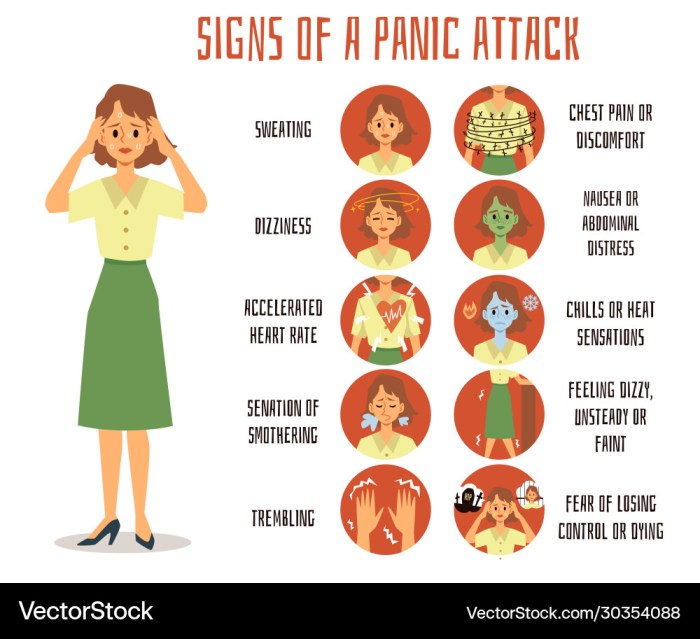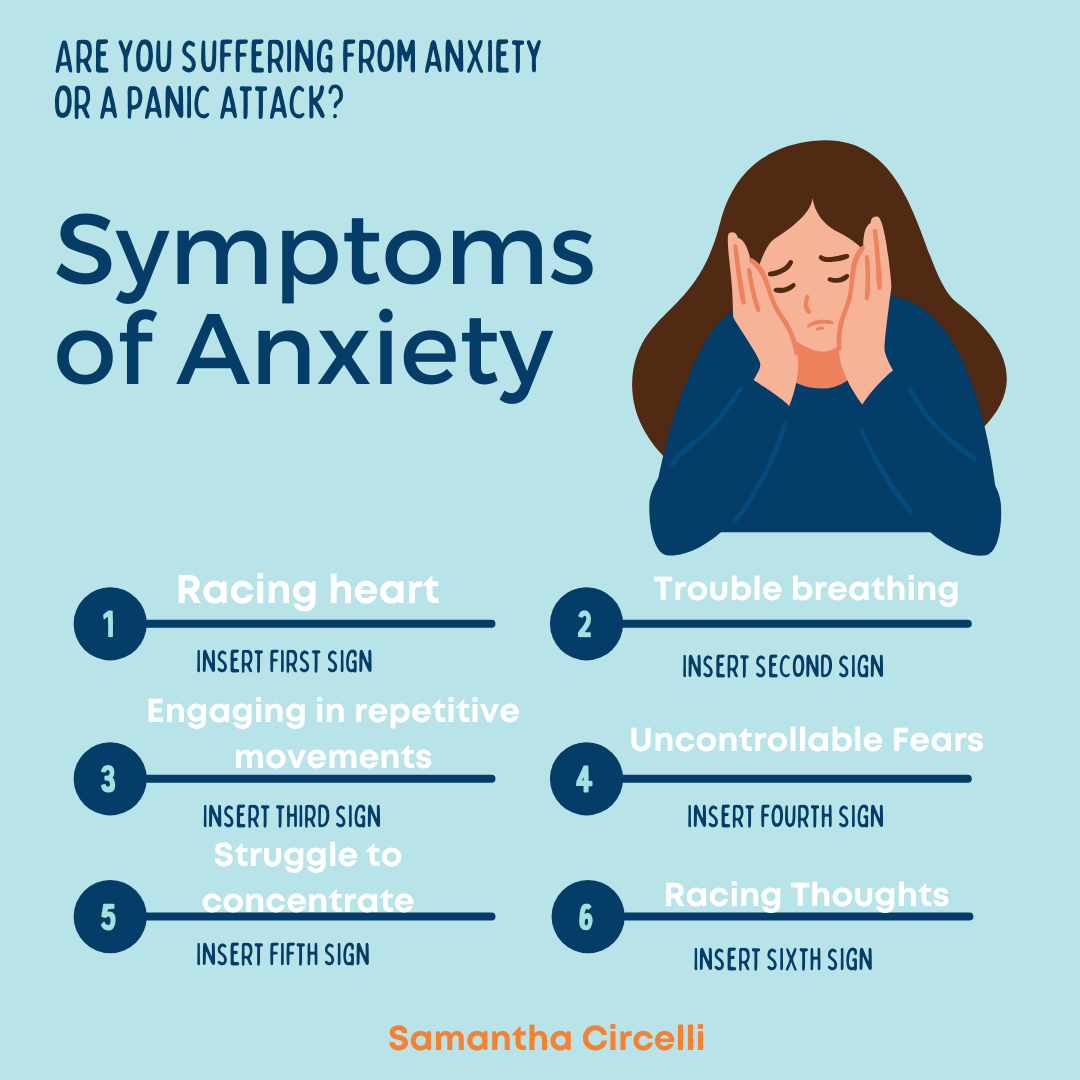Anxiety attack symptoms female: Anxiety attacks are a common experience among women, affecting millions worldwide. These attacks can be debilitating, causing a range of physical, emotional, and cognitive symptoms that can significantly impact daily life.
In this comprehensive guide, we will delve into the unique experiences of anxiety attacks in females, exploring the potential causes, common symptoms, and effective coping mechanisms. We will also discuss the importance of seeking professional help and provide tips for prevention and management.
Overview of Anxiety Attacks in Females: Anxiety Attack Symptoms Female
Anxiety attacks are a common experience for many females, affecting millions of women worldwide. These attacks can be debilitating and significantly impact their well-being. Understanding the prevalence, unique experiences, potential causes, and contributing factors to anxiety attacks in females is crucial for providing appropriate support and treatment.
Research indicates that females are more likely to experience anxiety attacks compared to males. This disparity is attributed to various factors, including hormonal fluctuations, societal pressures, and biological differences. Anxiety attacks in females can manifest differently, with some experiencing more intense physical symptoms while others report predominantly emotional or cognitive distress.
The potential causes of anxiety attacks in females are multifaceted and can include genetic predisposition, stressful life events, trauma, and certain medical conditions. Additionally, hormonal changes during menstrual cycles, pregnancy, and menopause can contribute to increased vulnerability to anxiety attacks.
Understanding the impact of anxiety attacks on female well-being is essential. These attacks can disrupt daily functioning, impair relationships, and lead to feelings of isolation and shame. The long-term effects of chronic anxiety attacks can include increased risk of depression, substance abuse, and other mental health conditions.
Common Symptoms of Anxiety Attacks in Females
| Physical Symptoms | Emotional Symptoms | Cognitive Symptoms | Duration and Intensity |
|---|---|---|---|
| Rapid heartbeat | Fear or panic | Racing thoughts | Minutes to hours; varies in intensity |
| Shortness of breath | Feeling overwhelmed | Difficulty concentrating | |
| Chest pain or tightness | Dizziness or lightheadedness | Feeling detached or unreal | |
| Sweating or chills | Nausea or stomach upset | Fear of losing control |
For example, during an anxiety attack, a female may experience a pounding heart, shortness of breath, and a sense of impending doom. She may feel overwhelmed with fear and have difficulty thinking clearly.
Distinguishing Anxiety Attacks from Other Conditions

It is important to differentiate anxiety attacks from other conditions that share similar symptoms. Panic disorder involves recurrent, unexpected panic attacks, while generalized anxiety disorder is characterized by persistent, excessive worry and anxiety. Depression can also manifest with anxiety symptoms, but it typically involves a persistent low mood and loss of interest in activities.
Seeking professional help is crucial to ensure an accurate diagnosis. A mental health professional can assess the symptoms, rule out other conditions, and determine the appropriate treatment plan.
Coping Mechanisms for Anxiety Attacks in Females
- Deep breathing exercises:Focus on slow, deep breaths to calm the nervous system.
- Mindfulness practices:Pay attention to the present moment without judgment to reduce stress and anxiety.
- Cognitive restructuring:Challenge negative thoughts and replace them with more positive or realistic ones.
- Exposure therapy:Gradually expose oneself to feared situations to build tolerance and reduce anxiety.
During an anxiety attack, try deep breathing exercises by inhaling slowly through the nose for four counts, holding the breath for seven counts, and exhaling slowly through the mouth for eight counts. Repeat this process until the anxiety subsides.
Prevention Strategies for Anxiety Attacks in Females

Lifestyle modifications can help reduce the frequency and severity of anxiety attacks in females. Stress management techniques, such as yoga or meditation, can promote relaxation and reduce anxiety levels. Regular exercise, adequate sleep, and a healthy diet are also essential for overall well-being and anxiety management.
Creating a supportive environment and building resilience can further help prevent anxiety attacks. Surround yourself with positive and supportive people, engage in activities you enjoy, and set realistic goals to avoid overwhelming yourself.
Seeking Professional Help for Anxiety Attacks in Females
If anxiety attacks persist or interfere with daily life, seeking professional help is essential. Cognitive behavioral therapy (CBT) and exposure and response prevention (ERP) are effective therapies for managing anxiety attacks.
Finding a qualified mental health professional is crucial. Look for a therapist who specializes in anxiety disorders and has experience working with females. The treatment process may involve individual therapy, group therapy, or a combination of both.
Final Conclusion

Anxiety attacks can be a challenging experience, but it is important to remember that you are not alone. With the right support and treatment, you can learn to manage your anxiety and live a full and meaningful life.
FAQ Guide
What are the most common anxiety attack symptoms in women?
Common symptoms include shortness of breath, chest pain, rapid heart rate, sweating, trembling, and feelings of panic and fear.
What are the potential causes of anxiety attacks in women?
Causes can include genetics, hormonal changes, life stressors, and certain medical conditions.
How can I cope with anxiety attacks?
Effective coping mechanisms include deep breathing exercises, mindfulness practices, cognitive restructuring, and exposure therapy.
When should I seek professional help for anxiety attacks?
It is important to seek help if anxiety attacks are frequent, severe, or interfere with daily life.